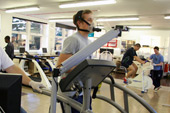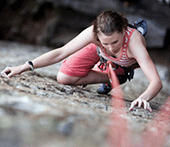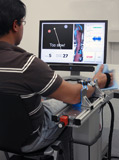 The main aims of the Physical Performance Division are:
The main aims of the Physical Performance Division are:
- To research and apply the relevant data to fitness regimens for athletes or for the average person.
- To evaluate motor performance, adaptability and motor development in children of school and pre-school age as well as young athletes.
- To evaluate behaviour (in terms of technique and tactics) in team and individual sports.
Planning of specialised training regimens
- Adaptation of specialised training regimens in relation to the age of the athlete as well as in terms of physical condition, muscular power, muscular endurance, somatotype, aerobic ability, speed, flexibility.
- Estimation and regulation of the overtraining level of athletes.
- Training regimens to improve the performance of athletes (various models)
- Planning of suitable training regimens for various ages of athletes in relation to their motor development and physical skills.
Evaluation of competitive behaviour
- Recording behaviour in terms of technique and tactics: A record of actions related to technique and tactics of professional and amateur teams is kept, for team as well as individual sports, by means of training in videoanalysis.
- Analysis and evaluation of behaviour in terms of technique and tactics: Statistic analysis of sports data/records in order to draw conclusions, by means of videoanalysis systems as well as statistical software.
 The Laboratory of Recreation and Sport Tourism aims to serve educational, consulting and research needs in the fields of sports tourism, ecotourism, working sports, management, organization and administration of sports & leisure, and physical education and leisure.
The Laboratory of Recreation and Sport Tourism aims to serve educational, consulting and research needs in the fields of sports tourism, ecotourism, working sports, management, organization and administration of sports & leisure, and physical education and leisure.
Specifically the Laboratory of Recreation and Sport Tourism:
• It studies Sport Recreation programs, the role and management of leisure in modern society as well as tourism and how new forms of exercise influence the study and organization of leisure businesses growing in the field.
• It covers basic educational needs at undergraduate and postgraduate level.
• It designs and implements leisure and leisure programs for all.
• It provides services and cooperates with sports organizations as well as with educational organizations.
• It collaborates with environmental agencies.
• It organizes seminars, lectures and other scientific events.
• It collaborates and exchanges views and knowledge with various academic institutions.
 The main aims of the Motor Performance & Physical Education Division are:
The main aims of the Motor Performance & Physical Education Division are:
- To familiarise students with the research procedure and use of laboratory instruments in order to study human behaviour in motor learning and performance.
- To teach basic concepts concerning the acquisition of motor skills through experiments, and to familiarise students with a broad spectrum of research plans and problems.
- To understand various measurement techniques used to separate temporary changes during exercise from permanent changes in teaching.
- To conduct research related to the development and improvement of cognitive, perceptive and motor skills as well as the implementation of different teaching and exercise methods.
- To conduct research related to the models of effective teaching of physical education, the effectiveness of the teacher and the adequacy of the content of the lesson.
- To acquire experience in the use of psychological skills in sports and in applying and using suitable tools.
 The main aims of the Clinical Exercise Physiology Division are:
The main aims of the Clinical Exercise Physiology Division are:
- To study body functions during exercise and the adaptations resulting from systematic training of athletes, and individuals with cardiovascular and otherchronic diseases.
- To evaluate physical abilities and identify health and physical condition factors, as well as factors affecting aerobic and anaerobic capacity, flexibility, body composition and anthropometric characteristics, in a wide spectrum of people.
- To record and observe various factors affecting human performance, talent scouting, energy metabolism, as well as muscular power production the force velocity relationshipas well as endurance by means of laboratory tests and field measurements.
- To explain and record physiological, metabolic, biochemical and neuromuscular parameters, hormonal responses, immune system responses, electromyographic activity of human muscle.
- To evaluate different exercise programmes on lipid, lipoproteins, hormonal responses, bone mineral content and endotheliumaffecting factors as well as muscle metabolism in people suffering from obesity, cardiovascular heart disease, diabetes, osteoporosisin the elderly.
 The main aims of the Physical Performance Division are:
The main aims of the Physical Performance Division are:

 The Laboratory of Recreation and Sport Tourism aims to serve educational, consulting and research needs in the fields of sports tourism, ecotourism, working sports, management, organization and administration of sports & leisure, and physical education and leisure.
The Laboratory of Recreation and Sport Tourism aims to serve educational, consulting and research needs in the fields of sports tourism, ecotourism, working sports, management, organization and administration of sports & leisure, and physical education and leisure. The main aims of the Motor Performance & Physical Education Division are:
The main aims of the Motor Performance & Physical Education Division are:

